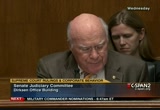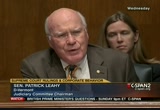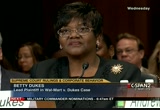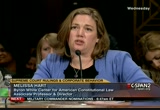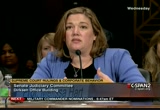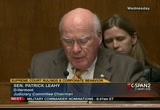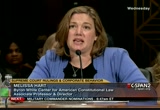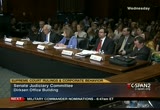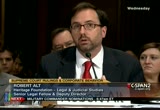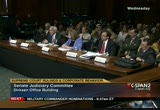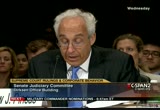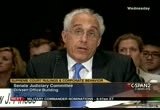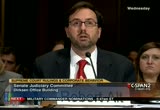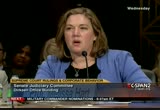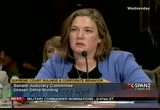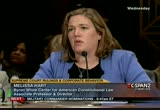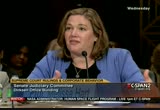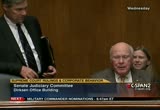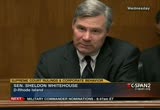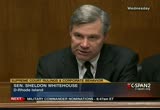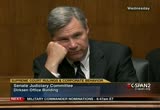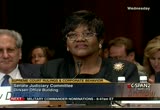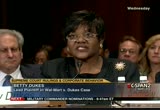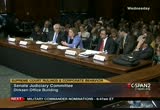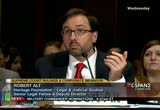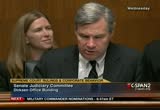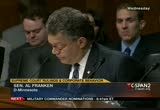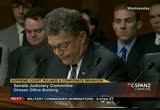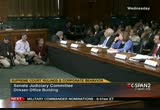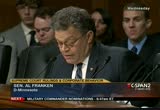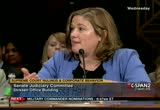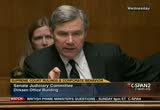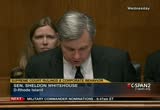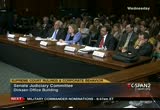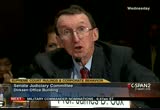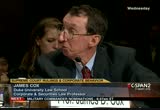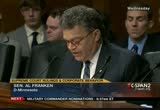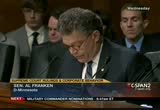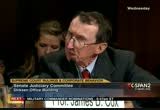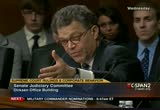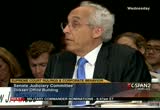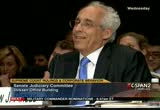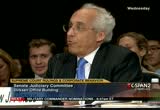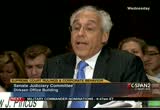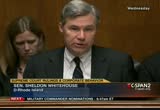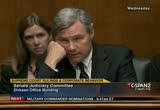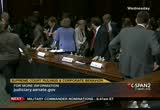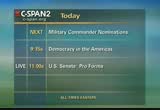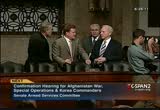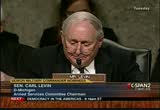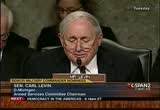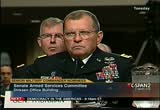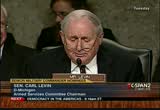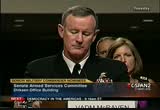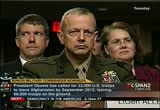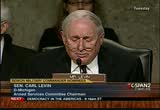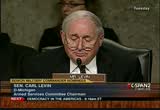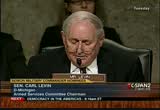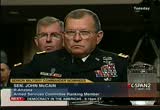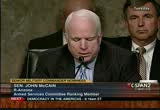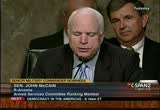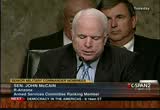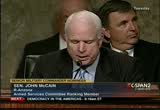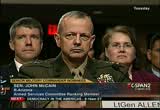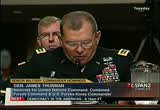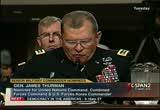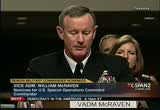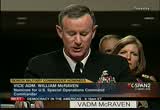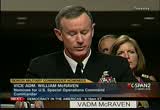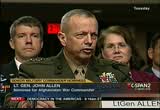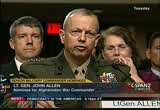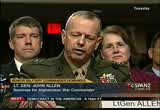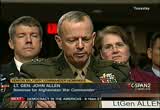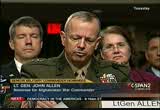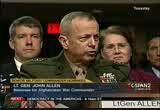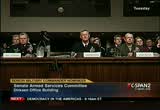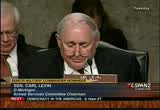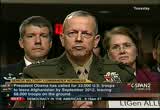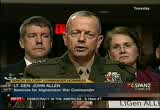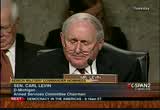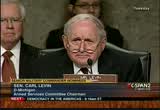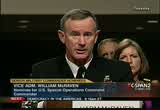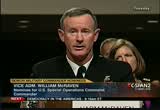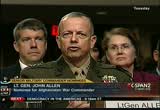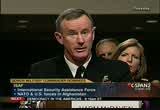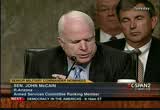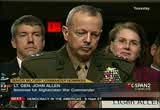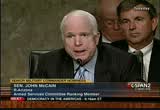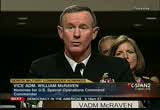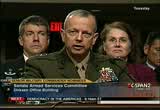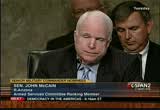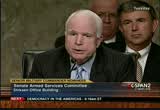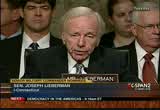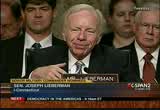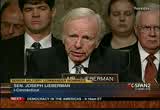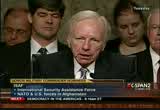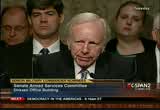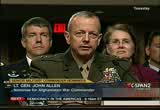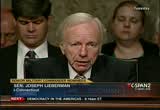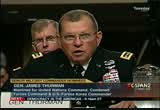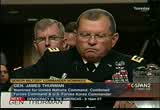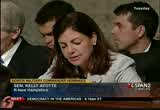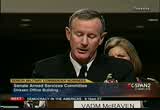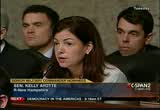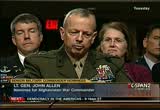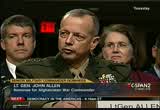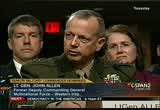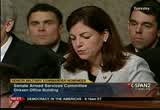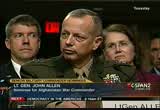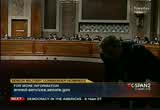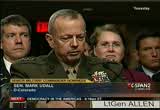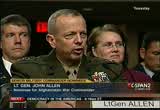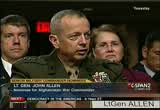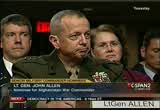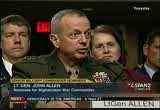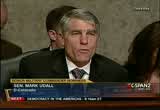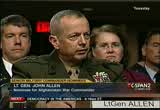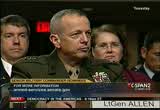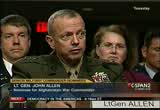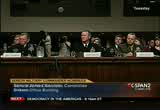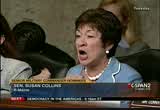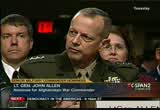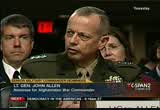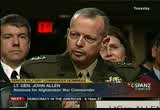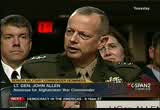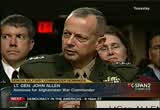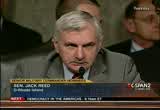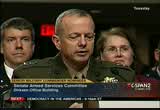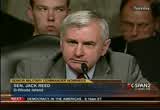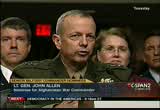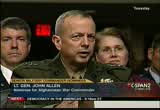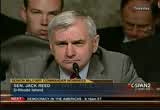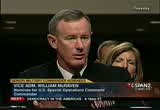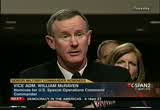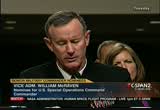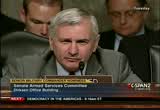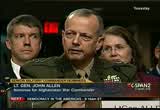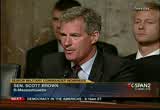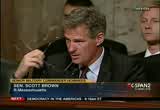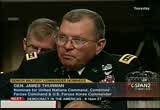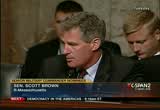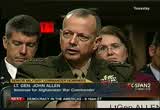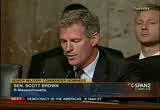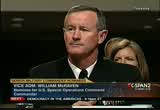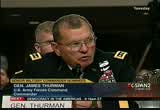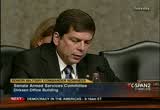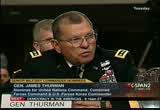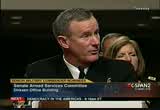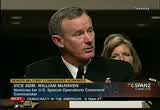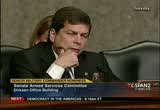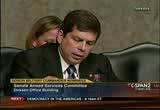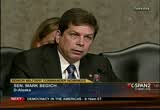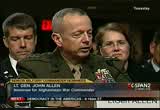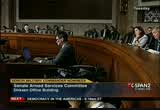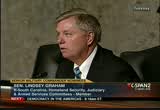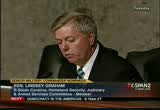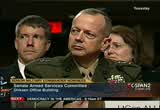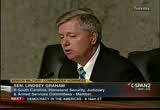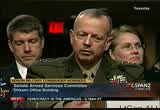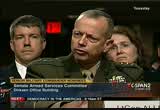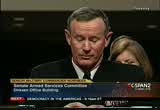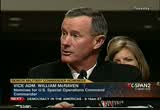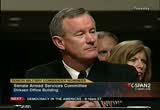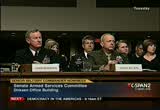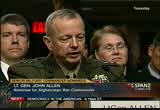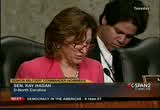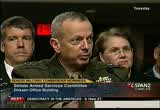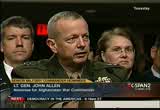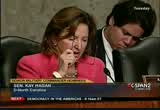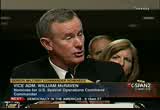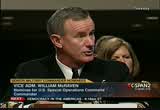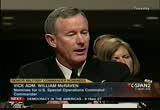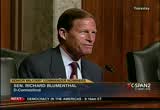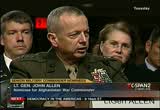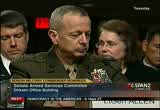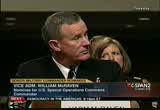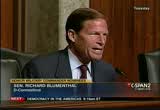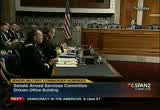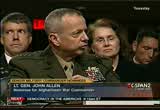tv Today in Washington CSPAN July 1, 2011 6:00am-9:00am EDT
6:48 am
6:49 am
what is truly a joint payoff general james thurmond, u.s. army nominated to be commander united nations command, combined forces command and u.s. forces korea, vice admiral william mcgreevey u.s. navy for appointment to the greed of that model and nominated to be commander u.s. special operations commander and lieutenant general john allen, u.s. marine corps of for appointment to be commander of the nato international security assistance force and u.s. forces afghanistan. thank you for your years of great service to this nation and your willingness to serve once again. let me also extend thanks to your families. support is so essential to yours and the nation's success as is the tradition of the kennedy i would invite each of you to introduce any family members or
6:50 am
friends who may be here with you to make your opening remarks. general thurman's nomination as the commander of u.s. forces in korea comes at a time of significant change and simmering change on the korean peninsula. our commitment to peace and stability in the region remains steadfast and alliance with the republic of korea is as strong as ever. the strength of that alliance will be particularly important over the next few years as we are embarked on an ambitious realignment of our forces on the peninsula and need to deal with the unpredictable and aggressive behavior of the north korean regime that continues to follow the destructive path of an international pariah. general thurman experience and positions of leadership and with maintaining a well trained, equipped and ready soldiers provide the kind of foundation and professional skills the will be required on the u.s.
6:51 am
commander in korea. vice admiral william craven is not need to be the ninth commander of u.s. special forces, u.s. special operations command. he's commanded at every level and special operations community. most recently as commander of the joint special operations command and served in various staff and interagency positions including the time in the national security council. incoming secretary defense leon panetta has credited him as being the, quote, real commander of the extraordinary operation that killed osama bin laden. add broth mccraven has been nominated at a time of exceptionally high temple growth for special operations forces. as the current commander mccraven willson told the committee since it 9/11, our manpower has roughly doubled,
6:52 am
our budget has roughly tripled, and i were overseas deployment has quadrupled. mccraven olson has also indicated the force beginning to show signs of, quote, but trading around the edges. admiral mccraven, the committee looks forward to hearing your thoughts of the stress on special operations, presinal can be mitigated given the demand for their unique skills. the committee is also interested in your view on the future of special operations and the challenges of the special operations personnel likely to face. will the announced drawdown of forces in afghanistan impact special rations, force is given its special operations forces depend heavily on their counterparts in the general purpose forces for many of the enabling kit devotees that the need to be successful. in addition the committee will be interested in your thoughts on the employment on the range of special operations to devotee against al qaeda and associated
6:53 am
groups outside of afghanistan, pakistan and iraq. director leon panetta expressed concerns on the shifting to other places most notably in yemen, somalia, north africa, and i hope he will address what you see as the appropriate role for the special operation forces in those areas. in announcing lieutenant general allan's nomination, president obama called him, quote, the flight commander to take over the vital mission in afghanistan. if confirmed, the general will have big boots to fill and succeeding general petraeus commander of the 49 member international security assistance force coalition and u.s. forces afghanistan. like general petraeus, general allen brings an in-depth understanding of the complexities of the counterinsurgency effort based
6:54 am
on his own experience as the commander in anbar province in iraq. working with the sunni awakening the marines and anbar succeeded in getting local sunni tribal leaders to reject the insurgency and instead support the iraqi government and its the deputy commander at u.s. central command general ellen has developed a regional perspective on issues affecting the region in afghanistan. he will be the first marine to serve as the top commander in afghanistan. the number one priority will be implementing president obama's decision last week to accelerate the transition of security responsibility to afghan forces and start bringing the u.s. surged forces home. as all land by the president, 10,000 u.s. troops will be withdrawn by the end of this year and the remaining 23,000 u.s. surge forces will be torn down by september of next year. the president's decision to use
6:55 am
the president on afghan leaders to assume more and more responsibility for their security. just as the establishment of the date to begin reductions have the effect of creating the sense of urgency on the part of the afghan government to take responsibility for afghanistan security. the assumption of the responsibility but the afghans is a path to successful mission and a stable montelimar and controlled afghanistan. the president's transition decision was buttressed by the significant gains the coalition had afghan forces part together made in the last year and reclaiming the former taliban stronghold particularly in the south. another major change in the last year is the surge in afghan security forces. there are now 100,000 more afghan security forces than 18 months ago when president obama announced the surge and another
6:56 am
70,000 afghan soldiers and police will be trained and equipped by the end of next summer when all 33,000 u.s. search trips will have withdrawn. in the testimony to congress last week, the chairman of the joint chiefs of staff admiral mollen characterized the president's decision as, quote, more aggressive and incurring more risk than mcraven had initially recommended. however, admiral mullen felt, could come only the president and the end can really determine the acceptable level of risk we must take because as he put it, quote, the truth is we would have run other kind of risks by keeping more forces in afghanistan longer. and among the other risks for the risks of perpetuating the greater afghan dependent on the forces and inhibiting the growth and keep the devotee and confidence on the part of the
6:57 am
afghan forces. the committee will be interested in hearing from the general as to his views of the president's decision to be again, gentlemen, our great thanks and gratitude go to each of you and to your families. senator mccain? >> thank you. let me thank our very distinguished witnesses who are each nominated for military command that is essential to the security of the nation and our allies, and i want to thank each of them for their years of dedicated service testing for again when called upon to serve when and where the nation needs the most. all of you will help lead a force that has been out war for ten years. we honor the service and sacrifice of our men and women in uniform and pray they will return safely and successful in their missions. general firman, you've been nominated to lead the forces on the korean peninsula at a tense time to read this long-running conflict in a critical time for the alliance in the republic of
6:58 am
korea we speech read the general sharp for his leadership over the past few years. the u.s. republic of korea has never been stronger and better. but the situation on the peninsula has rarely been as dangerous as it is today. the transition of power in north korea has contributed to a series of acts of aggression against our south korean allies. it's clear to me that if there's another such provocation clearly it will not turn the other cheek. this is serious implication for the united states as the treaty allies to the defense of south korea. we remain as committed as ever to our responsibility, and it's for this reason especially in light of the heightened state of alert the increased tensions we need to take a hard look at our current plan for the u.s. force realignment and to the normalization on the korean peninsula. this committee needs a better
6:59 am
understanding of this major undertaking. the cost of which are significant and growing. but ultimately what must guide the u.s. defense policy, vis-a-vis the republic of korea is the obligation to insure the mutual security and success. admiral mcraven, what you achieved in york career is all pretty extraordinary before may 2nd, 2011, but on that day by leading the mission that killed osama bin laden, you and your men won an enduring place in the american military history. so to say that i am confident in your ability to lead the u.s. special operations command is an understatement the admiral wilson has done an exceptional job and i'm confident you will build on this great work. if confirmed. the leader of al qaeda is dead but a new one is taken its place. your mission will be to help ensure that he meets the same end. at the same time, a series of deadly franchisees especially al qaeda and the arabian peninsula
7:00 am
continues to threaten security of homeland common interests, friends and allies. we continue planning and synchronizing our global operations and to continue building up the capacity of our partners to defeat our enemies far away from our homeland. finally, general allan, you have the biggest boots to fill of david petraeus but we know general petraeus personally recommended to and supported you as his successor to lead the mission in afghanistan could i can think of no higher compliment to pay a military officer. the challenge you will face in afghanistan is always going to be significant. but i fear the challenge has only been increased on necessarily by the drawdown of the u.s. forces the president announced last week. i agree we are making amazing progress in afghanistan. the progress is real and it's
7:01 am
remarkable but as the commanders on the ground all point out, it's also a fragile and reversible. our commanders also say that next year's fighting season will be decisive. this would be the opportunity to consolidate the gains in southern afghanistan while increasing numbers of u.s. forces shift their main effort to eastern afghanistan where they are counting the work al qaeda and other militant groups are still present and operating actively. however, under the president's plan which calls for having all of the units out of afghanistan by september but troops will begin flowing out of afghanistan right at the time that the taliban, al qaeda and terrorist allies began to step up operations next spring and summer. at the moment our troops could finish the main objective and begin ending our combat operations in a responsible way, the president now decided to deny them the forces that our commanders believe they need to
7:02 am
accomplish their objectives. i hope i am wrong. i hope this decision will not in danger the dreams the troops have made were the decisive progress they still need to make next year, but i am very concerned that the president's decision poses an unnecessary risk to the progress we have made thus far to the mission and to our men and women in uniform. after all we have given to this mission, the money that we have committed, the decade we have devoted and precious lives we have lost why would we do anything now that puts our mission at a greater risk of failure? by drawing down u.s. forces several months early so they miss the next fighting season, how much additional risks are be incurring and how could it affect the mission? those are just some of the questions we must answer this moment.
7:03 am
it's a pleasure to have all of you before the committee today. you all make me proud of america's armed forces and confident about future. thank you. >> thank you, senator mccain. let me now colin our witnesses for their steegmans. general thurman? >> chairman, senator mccain and other distinguished members of the senate armed service committee, i think you for the opportunity to appear today. i would like to thank the secretary defense and the president for nominating me to be the next commander united nations commander, commander united states republic of korea combined forces command, and commander united states forces korea. if confirmed, i look forward to working closely with this committee as well as our alliance partner of the republic of korea to address deutsch alleges and opportunities we face together on the strategically important corrine peninsula.
7:04 am
recognizing that a strong kick united states republic of korea audiences of the most important factors maintaining peace and stability on the korean peninsula and in the region at large, i will come if confirmed, continue to work with my predecessors directed at sustaining strong ties with our partner. i would also like to thank this committee for the support it has provided the soldiers, sailors, airmen and marines, our department of defense civilians and their families who selflessly serve the nation at home and abroad. is the commander of the army forces command, which is the army's largest organization, all too well aware of the support of this committee has provided and the difference the support has made to the men and women who serve the country in the armed forces. if confirmed i will make every effort to ensure those serving in the republic of korea will
7:05 am
receive the best living and training environment there can possibly be provided. if confirmed, i look forward to working with the committee to achieve this. i would also like to thank my wife of over 47 years. she has been negative as increasing our daughters who are now both married to army officers and bringing up our four grandchildren the also selflessly supported our soldiers and their families. like other military spouses, she is truly an unsung hero and i am blessed to have her love and commitment as i continue to serve the nation. with that i thank the committee for allowing me to appear before you today and i look forward to answering your questions. >> general, thank you so much. admiral mcraven? been a distinguished members of the committee, thank you for letting me the opportunity to be here today. i am deeply honored the president has nominated a team to serve as the next commander.
7:06 am
and if confirmed, i promise you that i will work tirelessly to ensure our that it continues to provide the american people the finest special operations forces in the world. joining me today is my wife who has been a constant source of strength to me and said the men and women of the families with whom i have served. i have been extremely lucky to have her by my side of the past 33 years. i have three children as well my oldest son is a captain in the air force, my number to such as completing his ph.d. in california and my daughter is going into her junior year of college. i have been very fortunate to have spent the past 34 years in special operations, and i can tell you from my personal experience, that the decision by the congress to establish the special operations command was the best thing that ever happened. as a result of your efforts and your interest in the wellbeing of the u.s. special operations sailors, airmen, marines and civilians, we have the best trained, best equipped and the most experienced special operations force in the history of the u.s. and possibly the
7:07 am
world. the special operations soldiers on parallel contributions to the security of the great nation in iraq, afghanistan and around the world are a direct reflection of the support we have received from the congress over the 24 year history. i want to personally thank you for their support. if confirmed, i will continue to trade, organized and equipped, deploying and when directed by the secretary defense, employ the force across this conflict. we will tall times be prepared to answer the nation's call with experienced forces his intellect, maturity and kurdish allows them to operate politically and militarily complex environments. men and women who relish challenges and willingly go where the threat to america is at its greatest. however, as good as the force is, i know if confirmed, one of my primary responsibilities will be to ensure the members and their families are well taken care of both physically and emotionally. in his 2011 posture hearing, he
7:08 am
noted that as a result of the ten years of the continuous combat, the forces freed the edges. admiral olson and his wife were exceptionally engaged in the welfare of the soldiers and their families particularly the wounded four years and if confirmed, doorjamb and i will follow the lead and put forth every effort to insure the wellbeing of the individuals in my command and families that support them. it has been my privilege to serve my entire career in special operations and in all those years i've never ceased to be amazed by the courage and sacrifice of the men and women in the special operations. i am humbled to be considered a sign it is their commander. thank you very much, and i stand by for any questions. -- before the damage. general allan? >> senator mccain, distinguished members of the committee, thank you for this opportunity to appear before you today. i am truly honored to be nominated by the president to come and the international security assistance force and the united states forces in afghanistan. i'm grateful to the members of
7:09 am
congress, the secretary defense, the chairman of the joint chiefs of staff for their confidence so support and assistance extended to me since my nomination. and of course, i am and have always been humbled by the incredible sacrifice of our service members and their families who've continued to serve the nation despite many hardships. mr. chairman, at this point i must note the will of this committee and its leadership in providing crucial support to the men and women who have offered a plea served in afghanistan and iraq. thank you for the support. i would like to start by acknowledging and thinking general david petraeus whose surface is a commander of isf has been so essential to generating the progress that we've seen in afghanistan. if confirmed i will seek to emulate his principled resolute leadership and if he is confirmed to be the devotee of the central intelligence agency, i look forward to a very close working relationship with him and the rest of the intelligence
7:10 am
community. i would also like to express my admiration for investor eikenberry and his team for their untiring dedication to the mission. if confirmed i look forward to working with my friends come ambassador ryan crocker with whom i served in iraq and the nato's senior representative ambassador simon, to ensure that our military and civilian efforts are closely synchronized. i would also like to express my profound admiration for all of the partner nations and their forces in afghanistan with 49 nations from all over the globe currently serving in afghanistan and supporting that mission. the scale of the coalition is truly historic. as general petraeus has noted, afghan and i sat forces halted the insurgency momentum and much of the country and reversed it in key areas. based on the work of the deputy commander in the central command numerous visits to fever over the past nine years including last month an extensive
7:11 am
discussion with senior military and civilian leaders a share in that assessment. afghan and coalition forces now largely controlled the battle space and strategically important areas such as kabul where one-fifth of the afghan population lives in and around kandahar the spiritual and historic sanctuary of the taliban and in helmand a former taliban stronghold and many other key areas. meanwhile we continue to exert unprecedented pressure on the insurgency with a variety of efforts in putting degette in local police initiative which is mobilizing communities to defend themselves afghan led efforts to reintegrate former fighters nearly 1900 reintegrated in a variety of governance and develop initiatives focused on establishing the conditions to achieve long-term security. much of this progress has been unable to buy and increasingly led by the afghan national security forces conducting their
7:12 am
own surge. they are currently on track to meet the 2011 goal of 305 troops , 3,500 trucks and substantially more and more capable afghan forces would be trained and field over the next year as well. although there are reasons to be cautiously optimistic there are challenges remaining. insurgence still maintain the full capabilities and the fighting will continue to be intense and some of the areas as the enemy seeks to recover lost territory. the transnational terrorist groups like al qaeda will seek to establish new bases and safe havens in afghanistan and pakistan and corruption and other challenges to good governance will still need to be addressed. still, none of these challenges are insurmountable. as the president announced last week in the front of the west point commitments we will begin the drawdown of the surge forces next month. although i was not a participant in those discussions i support the president's decision and we
7:13 am
can accomplish our objectives. comfortable offer my assistance to the chain of command on the current state of the conflict as well as provide options with respect to the president's goal and accomplishing the strategy. even once the security surge forces have been removed there will still be some 68,000 u.s. troops and thousands of international forces in afghanistan, not to mention some 70,000 more afghan forces which will join the fight in the next 15 months. at the same time the u.s. and nato are both discussing long-term strategic partnerships with afghanistan. it sends an import a message of commitment to the afghan people as well as a sense of urgency afghans must take more responsibility for their security. i'd like to close by thanking my family but most important my wife, kathy who's with me here this morning for her years of dedicated and loyal service to our magnificent troops and their
7:14 am
families. kathy reza or two daughters often alone during the career we've been married for 34 years and they've grown up those two young ladies to be wonderful and independent women and citizens. i'd also like to add kathy and i understand the sacrifices of the war with both our families having experienced conflicts firsthand across the span of american history. if confirmed i assure you and all the military families i will do everything i can to provide the forces in the thinnest and with the resources they need to accomplish the mission and return home safely distinguished members of the committee it's been a great honor to appear before you this morning and i am prepared to answer your questions. thank you. >> thank you, admiral fallin now let me ask the three of you the standard questions we asked our witnesses. have you adhere to applicable laws and regulations governing conflict of interest? >> i have. >> do you agree when asked to
7:15 am
give your personal views even if they differ from the administration and power? >> i do. >> u.s. and many duties you were taken would presume the of got the confirmation process? >> i have not to raise and i will you ensure your stuff complies with deadlines established for the request communications including questions for the record in hearings? >> i will. >> will you cooperate in providing witnesses the response to congressional requests? >> i will. >> would this be protected from reprisals for their testimony or briefings? >> they will. >> do you agree if confirmed to testify upon request before this committee? >> i will. >> do you agree to provide documents including copies of electronic forms of communication in a timely manner when requested by the duly constituted committee or the consoles with the committee regarding the basis for any good faith, delay or denial in providing such documents? >> i will. >> okay. let's try seven minutes first round. we have three votes at noon,
7:16 am
which may complicate this. we will see how it works out. general, let me start with you. you indicated in your questions before the hearing and in your testimony that you agree and support the president's decision on u.s. troop reductions in afghanistan. can you tell us more why you do agree with this decision? >> the president in december the ninth enunciated the strategy as a result of the culbert process of the review of the situation in afghanistan which was to be resourceful well in a number of different ways but in particular would surge forces. at that time, he announced the forces would begin to be withdrawn in july 11. there were two points i think were made importantly in that speech. one was the nature of the resources of the strategy was a clear signal of u.s. support to
7:17 am
afghanistan and our intent to provide afghanistan the opportunity and the time to begin to develop its afghan national security forces to provide security to the country but also the other aspect of his announcement was beginning to withdraw the surge forces in july of admiral mullen sends a message of urgency to the afghans they must begin to take ownership of their security themselves. the president's announcement in west point set the schedule ultimately for the withdrawal of the forces. this was augmented in the meeting in lisbon, the conference and was in november november 10th where the schedule for transition was developed, where our security forces would provide ultimately to cover for the afghan forces as the transition of the terrain and afghanistan proceeded from 11 to 14. in essence of the end of 14 the
7:18 am
security forces been in the lead across the country. that brings us to the president's announcement. we expected he would begin the process of the withdrawal. he has made that announcement as general petraeus and the chairman said last week, we are counting for that number. we will begin the implementation. he has begun the implementation in afghanistan with his i sat staff to implement the president's decision and i support that because that decision was timely and it provides a full accounting for the president's commitment in december 09 and as we begin the implementation, we will continue to have 68,000 american forces on the ground and swing above 70,000 afghan national security forces, and we anticipate this decision by the president can be accounted for within the current strategy. >> how important is it for the
7:19 am
success of the mission in afghanistan that afghan security forces take ownership of the responsibility? >> its essentials. in the end our strategy has envisioned the afghan security forces would take ownership all along. and in the aftermath of the lisbon conference, the intent was as agreed to by the member nations of the coalition and by president karzai the transition would be completed by 2014 where the isf forces would support the development and the deployment of the afghan national security forces by the end of 2014 to be in the position to provide strategic overwatch so it is essential to the strategy. >> now let me ask you, admiral, d.c. the president's announced reductions as creating problems
7:20 am
for special operating forces in afghanistan? >> i do not. as the general mentioned there will still be a sizable force and coalition forces for soft operate effectively in afghanistan we need to make sure that we continue to have the infrastructure which will remain in place and frankly and confirmed i will work with general gallant the counterterrorism and soft requirements with conventional requirements said at the end of the day we are still able to put pressure on the enemy. so i do not think the drawdown will affect. islamic adderall, what is the role of the afghan special forces in the counterterrorism operation that have been carried out and how would you assess the capability of the afghan forces. >> there's a number of different afghan forces if you will. there's the afghan commandos which are trained by special
7:21 am
forces personnel and they are clearly some of the elite afghan forces and a magnificent soldiers and afghan special forces which are the green beret counterpart and then with the forced by operated what we had what we referred to as the afghan partner units. these were afghans on target with the forces to ensure we had an afghan that was if you will going through the door making first contact with the locals in order to make sure we protect the culturally sensitive issues and items on the target. so the afghans we worked with our top-notch to be honest with you. >> how important is it to our counterterrorism effort and counterinsurgency effort that they would be in the lead, the afghan special force would be in the lead. >> i think it's very important as general allan mentioned at the end of the day the afghans have to take ownership for the security of afghanistan and the same thing applies to special
7:22 am
operations. at the end of the day we have to make sure the afghans take the lead in special operations recognizing that right now we still need to maintain a fair amount of overwatch, but at that time hopefully the overwatch will diminish and take a larger role. >> do you feel capable of doing so? >> i do. >> let me ask admiral, general, the safe haven enjoyed by the haqqani network and pakistan continues to provide freedom for that group to launch attacks against the united states and coalition troops in afghanistan. you both i believe talked to the pakistani military leaders. why do they refuse, but uzbeckistan refused to take on the haqqani network and in your judgment is that going to change? let me start with you, general. >> i think it is a complex answer we would receive from them. it is a functioning of capacity,
7:23 am
but it might also be a functioning of their hedging whether they have determined that the united states is going to remain in afghanistan, whether our strategy will be successful or not at some point as we have emphasized we have got to bring pressure to bear on this safe haven. in the and what we would hope is that they would listen to our desire for them to do that and muster the capacity and the capability and ultimately put pressure on the haqqani network to deny that safe haven from which the element of the taliban can move across the border and conduct operations and the afghan national security forces as the takeover more of the security. >> is this likely to change in the near term? >> i don't think it is likely to change. i would agree it is a very complex situation obviously in pakistan and as a opportunity to talk to military leaders in
7:24 am
pakistan, this is, again, it is with a capacity issue for the pakistanis, and i think potentially as a willingness recognizing the situation is difficult for them to deal with. >> something's got to give, something's got to change. it can't continue this way for them to expect we are going to have a normal relationship which we hope for, but it can't continue this way with that expectation in place. senator mccain. >> thank you mr. chairman. general, do you know of any military leader that recommended in 2009 the the president make an announcement in 2011 and travon of troops? >> i do not, senator. >> deal with any military leader that recommended the drawdown plan the president announced last week? >> i do not, senator. >> does it surprise you that
7:25 am
after the president's announcement that president sarkozy, the british, of their allies have now announced they will be withdrawing from afghanistan? >> it does not. >> did you see the picture in the paper over the weekend of president karzai and the ayatollah khomeini sitting down at a meeting pledging friendship support for one another? savitt i didn't see the picture but i was aware of the meeting. >> is it true that the ied and in effect in iran are still coming across the border into afghanistan and killing americans? >> i believe they are, sir. >> did you hear of a statement of the leader, the taliban field
7:26 am
commander told the daily beast of his reaction to mr. obama's speech, quote, my soul and the soul of the thousands of taliban have been blown apart happy. i had more than 50 encounters with u.s. forces and their technology the the biggest difference in data war leznoff technology, but the more powerful islamic ideology and religion. are you aware of the statement by the taliban? >> i am, sir. is the president's announcement of this winstrol make your job -- if confirmed, i assure you will be -- harder, more difficult and challenging or easier? >> senator, that is a difficult question to answer. >> i'm sure it is. that's why i asked it. >> not been confirmed yet or being the commander, have no ability to access with great accuracy of this particular
7:27 am
moment. as the chairman said, the announced decision was a bit more aggressive than we had anticipated that he supported the decision congenital petraeus supports the decision and is working now to begin the implementation of the decision and we anticipated the forces would be coming out and there's a lot that has to happen between now and the end of this year and the end of the purpose of the drawdown. >> i appreciate that and i appreciate your answer. >> i talked to probably 20 retired and active-duty military leaders since the president's announcement made to the challenges are enormous the question is whether we will still be able to succeed or not and i appreciate your willingness and patriotism to take on what is obviously a
7:28 am
dramatically increased risk. the economist states again this week. mr. obama would only have himself to blame if entirely domestic political reasons he undermines the conditions for a security transition to afghan national forces. by 2014 it still looks just about doable. the rush for the exit could end up delaying the very thing he's hoping for. i'm hoping that summarizes the views. admiral mcraven, do you believe the united states should have a residual force in iraq in order to assist with particularly the special operations functions and intelligence. >> would be mutually beneficial to us and the iraqi is it in fact that was the case. obviously it remains to be seen whether the iraqi is will want
7:29 am
us to stay past the intended to draw down time. there's a small and soft presence there i think would be advisable. >> if we look at the recent u.s. casualties, the situation at least in some respects has literally shown some deterioration would you agree? >> that appears to be the case. >> do you believe we ought to have an enduring military presence for example airbase in afghanistan and everything that i know and here is president karzai is very interested in such an arrangement. >> we would have an enduring military relationship with the afghans. it would be negotiated and
7:30 am
ultimately the missions and rules and functions would be determined i think remains to be determined by discussions with the afghans and certainly our own discussions and determinations. with regard to a permanent base i don't believe we need a permanent peace in afghanistan we can conduct operations over the long term from the shared based in concept. >> i guess to get into the semantics now, the base concept is fairly agreeable. this committee has shown serious concerns about the cost and policy of the base realignment. i hope you will work with us closely on that issue and we are going to ask for a sort of pause until we can get an evaluation. my question though is that there's been recent public reports about a north korean ship that was turned around that we have had materials which
7:31 am
would have had some press reports or have some perhaps nuclear technology on board and headed for burma turnaround by the u.s. and headed back to the north korea can you tell the committee about that? >> i do know that there's too united nations security council resolutions, 1718 and 1864 the purpose is to prevent the proliferation of nuclear weapons of mass destruction from the north. i believe it is very important that we continue to monitor that carefully and it needs to be dealt with in my whole of government approach. >> thank you. can i say congratulations to the
7:32 am
three if you and you make us extremely proud that the united states is blessed with such leadership and dedication and sacrifice and that includes your families as well. >> thank you, senator mccain. senator lieberman. >> thanks. i would just pick up where senator mccain left off and say that listening to the opening statements the three of you made and hearing that respond to trim 11, senator mccain which i wouldn't describe as softballs i think the cumulative effect is that you are an impressive group. today i think you've shown your intelligence and your records speak with extraordinary power to a career of patriotism, bravery and leadership capacity, and you remind us how every american has to be grateful to you and everyone else and all
7:33 am
you do every day to protect our security and freedom so i think you very much for that. general, i want to get into the decision that the president made last week about and announced about afghanistan and just ask you this question. as i understand what was announced, one way to look at it is that this year we will withdraw, this calendar year we will withdraw from afghanistan 10,000 of the 33,000 troops we surf as a result of the president's decision in december, 2009. next year we will withdraw the remaining 23,000 by some time in september. but here's what i want to ask you. my understanding is that within those parameters of this year and next year, and you as the commander will be given latitude
7:34 am
to determine both the pace of the withdrawal that will begin in july, and which of the forces are withdrawn. is that correct? >> that's correct, sir. >> the second question i want to ask is in your response to the question submitted by the committee, used the and i quote, we will constantly monitor and assess the situation on the ground, and should determine the situation has changed, i will so advise my chain of command through the proper channels, end of quote. so my understanding with what you are saying is that if and as we go through this hearing to next year you find that the pace of the withdrawal is having an affect on what's happening on the ground in afghanistan that you think is really - and exercise authority to report
7:35 am
that a purchase of command, and if necessary, hypothetical, to ask the pace of withdrawal be slowed down. >> when i take command of isf i'm going to monitor the operation conditions constantly not just as it relates to the drawdown of the force is with respect to the surge through the entire period i command during the campaign. and it is my responsibility to the chain of command in chief to insure should i be concerned for the progress and execution of the campaign isolette vice the chain of command with a forthright advice and it's an important responsibility, sir. >> i appreciate the reassurance and admiral mcraven, with regard to afghanistan, obviously the special operation forces have played an extraordinarily important role in the
7:36 am
counterinsurgency strategy that we are carrying out. there was a significant success. is it your expectation as the drawdown of the forces overall pursuant to the president's decision last week goes forward the the special operations forces are likely not to be a drawdown in the number? i think you know what i'm asking. >> i think that remains to be seen, and again, if confirmed i will work closely with the general allen to take a look at what the right balance is for the special operations forces. again, we've got to strike a good balance between the conventional peace and the various elements in order to be successful. >> i accept that answer. my own sense is the numbers drawn down it may be the special operators and a special operating forces are going to be even more critical so in some
7:37 am
sense not to the last, but you would want a critical mass as this goes on. general, do you have an opinion going in about that? >> i do, senator. we are currently engaged in a comprehensive military counterinsurgency campaign of which counterterrorism and the role of the forces play a very important role. as the campaign continues to mature in and we look at the progress on the ground, we may see their role may increase as time goes on within the context of the counterinsurgency campaign. and it was more than simply direct action or start operations. it's to the sec to allow but the capacity as the admiral mcraven said with respect to the afghan security forces but also playing a vital role on the ground in the store will shred of the afghan police program and
7:38 am
the stability operations program. and all of that together constitute an enormously powerful contribution by the special operating forces to the campaign today, and we would see that enduring contribution over the long term out to 2014. >> thank you. general sermon, arguably will be assuming the command in korea at the most dangerous time in quite awhile, and i say that based on the continuing provocations by north korea of our allies in the republic of korea by the statement the president public of korea made that if there's other provocation will be the response and measure from south korea or allies, but also because we are watching a pattern of aggressive behavior
7:39 am
by the people's republic of china in the region generally that is quite different than we have seen for a while really staking claims to territory in the kind of sovereignty, extended sovereignty we haven't seen in quite this way. i wonder going and whether he would give your reflections on the state of mind of the leadership of the two countries that most worries me. very different obviously. one is north korea and the people's republic of china which we have an ongoing comprehensive relation to we try very hard to manage in a constructive way. the north koreans and no different place. >> i've had the same concerns going into. i believe kim jong il is an
7:40 am
unpredictable leader and antagonize through the coercive diplomacy to protect his nuclear capability and there is a vitre rating economy is a food shortage, so i think he will continue the cycle of provocation and it's important for us to work closely with the republic of korea. the military to counter the provocations and in a responsible manner and to also meet in the relations in china and to work with the admiral as the commander to ss dhaka security posture and stance
7:41 am
particularly on the peninsula. >> thanks to the three of you. thank you, mr. chairman. thank you, senator lieberman. >> thank you, mr. chairman. i first of all want to say that we are blessed and grateful to have the service of all three of you for the country and i want to thank your family is an old that served under you for what you have done, and we have a great confidence in all with your qualifications. i wanted to ask the vice admiral mcraven in your evidence policy questions, your asked what are the weaknesses and shortcomings in the current effort to combat terrorism in insurgency in afghanistan, and in one of your answers, you said the weaknesses and shortcomings a rise of from the strategy or the efforts of the soldiers, marines, air men and civilians on the ground, of the diminished
7:42 am
resources, lack of long-term commitment and any decrease in international assistance. vice admiral, can you elaborate for me what you meant by that statement in terms of the concerns about diminished resources or lack of long-term commitment? >> yes, ma'am. this is basically focused on what we refer to as the enablers. so for us the special operations that continue to be successful in afghanistan is going to be a function of ensuring that we continue to have the airlift we need and the support, the fixed-wing support of the audience are in terms of the unmanned uav. that is the aspect of the support that is critical now and for the long run for the special operations to be effective. >> and does the president's recent withdrawal announcement in your view impact the lack of the long-term commitment of the issues that you've raised? >> no man i would contend it
7:43 am
doesn't direct soft directly it is a function of how you balance the winstrol and in discussions with general allan i will make it clear that as general allan look said the withdrawal he takes into consideration the enablers necessary to continue support special operations across the battlefield. while it is not just about the deduction piece which is important, and in my former role as the jsoc it was important but that support the broader soft fur to afghanistan. >> are there any other concerns you have about the diminished resources and based on what you highlighted in your statement that we should be aware of? >> no man. the two primary ones are the airlift support and the audience are support. >> thank you. >> the fighting season in afghanistan is roughly from
7:44 am
april through october, and the president has decided on september, 2012 on the deadline for the withdrawal in the surge forces. is there in a strategic operational or tactical advantage to the september deadline for the withdrawal during the season as compared to wading through the fighting season? >> senator, i think the value of a second fighting season as was expressed by the chairman and general petraeus in the testimony last week is important, but as general petraeus said in his recommendations, those recommendations are forwarded to the central commander and secretary defense and the
7:45 am
discussions which ultimately generated the president's decision account for the president's unique role and position in terms of his national security views as president of the united states and the commander in chief. and so he has made the decision at this juncture with respect to when the end of the drawdown of the forces should occur. we support that decision. we will implement that decision and are in the planning process now, senator, and as i said before to senator lieberman it is my intention as the commander to monitor the progress. the operational environment and the progress and the situation with respect to the accomplishment and to the campaign plan. should i become concerned that our ability to accomplish those objectives are threatened, i will ensure a gift forthright
7:46 am
7:47 am
be consistent in their presence, tens of thousands of isaf forces, 50,000 more national security police and army forces and some 20,000 or so of the afghan public protection force. they will all be joining the fight, they will all become part of the process during that period of time. so again the president was presented recommendations by the commander of isaf, forwarded by the central command commander and the discussions were held in the white house and the president applied his view. ultimately, the president of the united states and the commander in chief, and made the decision. >> i appreciate that, general. and i understand that you didn't participate in those discussions. but their recommendations were different than the ones that the president adopted in terms of timing after the fighting season; is that right? >> the chairman said the president's decision was a bit more aggressive than what was
7:48 am
recommended. >> one the concerns was a more aggressive recommendation, of course, is as senator mccain has outlined, given the progress that we've made in afghanistan, that that progress -- we could see a regression of that process; is that right? >> well, we're going to take advantage of the opportunity between now and the end of the year to assess where we are with the progress of the campaign. we have made really spectacular progress in the south. i wish all americans had the opportunity to see the great work that has been done by the forces at work. isaf forces in the south and southwest. working to consolidate that progress and at some point take other actions which i won't get into the great details here. we'll take other actions as necessary. the president's decision will be accounted for, obviously, in the planning that will go forward. and we anticipate that we will continue to achieve the
7:49 am
objectives of the campaign. but we must account for the decision that is the president has made and will go forward with those -- accounting for those decisions will go forward with every intention of accomplishing the objectives. and we believe that can be done now and we're moving forward with the planning with the isaf staff now. >> general, i want to thank you for your testimony. my time is up. but you had the opportunity as a new senator to go to afghanistan in january. and i was very impressed with the progress that has been made. and i guess i would share -- i remain concerned and appreciate the challenges that you face with having to withdraw a significant number of our troops during that fighting season. thank you for your testimony. >> thank you, senator. >> thank you, ayotte. senator udall. >> mr. chairman, thank you for your presence and i want to associate myself with the remarks of my colleague on the
7:50 am
results of your service and acknowledge the families that are here and wonder americans. if you could turn to you, i know you are going to have some challenges. you've got a leadership record that's exemple re. let me turn to the success that you had and we are in anbar in iraq. you reached out to an operation that was hostile and worked with them to turn their focus to al qaeda and the elements of terrorism that had really created enormous chaos. and in the process, the coin doctrine was validated. i don't want to imply that the two countries are alike. but could you talk about the primary lessons that we learned in anbar and how we are going to apply those lessons in
7:51 am
afghanistan? >> senator, much of what was accomplished in the anbar providence, needless to say, much of it was accomplished on the shoulders of the sacrifice of many terrific soldiers and marines and sailors and airmen. we honor that service and their sacrifice and having accomplished that remarkable outcome. what was accomplished in the anbar providence was really the result of a comprehensive, civil military counterinsurgency strategy. it was a strategy that leveraged every aspect of what military capacity could be brought to bare in the battle space, civil affairs, conventional military capabilities, advisory capacity to build the iraqi police, the iraqi security forces of the two divisions of iraqi infantry that we had. special operators who worked both as advisors and mentors. but also the term black soft, the strike forces that would enter the battle space to attack the insurgent network.
7:52 am
we pressurized the network constantly. while we were pressurizing and shredding the network and bloodying their capabilities, we worked very, very hard to build the capacity of the iraqi security forces, both the army, and we went from 4,000 police to almost 30,000 police in the year we were there in '07 and '08. all of that was complimented by a comprehensive plan with respect to civilian outreach as well. usaid resourced three embedded prts and resourced our prt, our prudential prt. and i believe that the wise outreach to the shakes in -- shs in the tribe, and the outreach to the stabilization and governance project, where the
7:53 am
governance had been completely shattered as a result of the al qaeda and the efforts, that comprehensive effort paid off in the end. it built up governance which had the capacity to stand up on it's own two feet and extend the writ of the prudential government out into the districts and down to the municipalities and even to the tribes. it incorporated the tribes into the solution, rather than have the tribes be on the outside of governance and part of the problem. it ultimately built the capacity for the people of that providence, the people along the river, to ply their trade to engage in economic development and that in conjunction with the persistence governance all overwatched by u.s. forces, but eventually over watched by iraqi security forces provided the trade space necessary ultimately for the persistence of government and the mess that we've seen in the aftermath to
7:54 am
the anbar providence, sir. >> let me jump to afghanistan in that context. we've been talking about the withdraw numbers. and the concern that some have about the effect on the fighting season next year. i know we have full compliment for this fighting season. do you think you are going to have to shift to counterterrorism model or can you blend the two strategies -- i know we throw the acronyms around casually. can they be implemented simultaneously in different providences, depending on the need of those populations and the strategy that you have in place? >> indeed, senator, it's occurring now. there is an active counterterrorism capability that is under way within the larger counterinsurgency to campaign. and as vice admiral raven knows so well and our task force commander in the central command, the capabilities of those strike forces have really been spectacular in getting at
7:55 am
the enemy's network. as well the use of sov as i mention will have a role of developing and supporting the training of the afghanistan special operators as well as facilitating ultimately the mobilization of the populations in the key villages where the afghan local police are being expanded. so to answer specifically your question, we would say there will continue to be a counterterrorism dimension to the overarching counterinsurgency campaign. and as time passes as conditions in the battle space evolve, as we approach 2014, and as we define our long term relationship with the afghanistan, we may well see that the development of ct will become even more important as time goes on. there will be an important role here. >> would you talk about
7:56 am
reintegration. do we have enough formal structure. there's been statements there's more we could do, and we've sent mixed messages to the fighters and taliban that want to come out. >> reintegration is essential to a counterinsurgency strategy. it helps to decompose the base of the insurgency. the afghans ultimately will be responsible for reintegration. it is their program. they are responsible for accepting the fighters and reintegrating them back into afghan society. so that effect, the afghan peace and reintegration committee has been formed at a national level. there are prudential peace committees that have been formed throughout the country. and in the process, we are working closely with our afghan
7:57 am
counterparts to facilitate the reintegration process which ultimately is that local fighters and many of the fighters are, in fact, close to villages, close to the homes, local villagers who desire to leave the insurgency and become part of the future of afghanistan will put down their weapons, renounce violence, sever their ties with al qaeda and the insurgency and become part of the solution. become part of the peace process. and in return, the village elders and the village benefits ultimately by bringing them back into the fold and through the use of funds which are cycled through the afghan government through the peace and reconciliation committee counsels project are performed in the villages which benefit everyone and the quality of life improves for everyone. so the village leadership vouches for the young fighter who has come off of the battlefield. they embrace him, bring him
7:58 am
back, make him reintegrated, the whole vimmage -- village benefits as a result. with what we can do better, we are just getting started. the infrastructure within the afghan side is really just beginning to gain purchase at this particular time. and as we recognize as a persistent shortfall in afghanistan and a number of different areas the ability to flow resources from the central government down through the providences and ultimately into the projects for the reintegration program, that is the challenge at this particular moment. i know that our civilian colleagues are working very closely with their afghan counterparts to improve the ability to get this money on budget and get it flowed and the expeditious manner to take advantage of the opportunities as these fighters come off of the battle space. we're at about 1900 soon of
7:59 am
those individuals who have formally reintegrated. there are about 3,000 in the pipeline. so getting this process accelerates has the effect of providing another operate if you are a fighter. you can fight u.s. or afghan forces and be killed, be detained, or put your weapon down and become part of the future of the afghanistan, be reintegrated into the village, and the village will benefit. i think that's a stark option. >> thank you. my time has expired. i look forward to working with you on this issue. this is the key element to bring our forces home and successfully concluding our operations in afghanistan. >> thank you. senator collins. >> thank you, mr. chairman. first let me thank each of you for your service and your willingness to accept the new challenges. general allen, the people of
8:00 am
maine have paid a heavy price. our state has suffered the highest rate of casualties of any state in the nation. we've seen lots of discussion at this hearing and others last week about the number of troops, the pace of withdraw, and the timetable. but i have for you a more fundamental question. and that is -- is there any number of troops that can ensure a stable afghanistan that is going to be able to take responsibility for it's own security given the safe havens and turmoil in pakistan and the
8:01 am
lack of confident central government that is not plagued by corruption. in other words, are these such insurmountable obstacles that no matter how many troops we have for how long and how brave and skilled they are, are those two facts the safe havens in pakistan, the corruption and incompetence of the central afghan government insurmountable obstacles? >> senator, i don't believe so. there are challenges. there are significant challenges. those have been explained by the current isaf commander and the chairman of the joint chiefs. i believe the campaign as we currently envision it's unfolding has the development of
8:02 am
the afghanistan national security forces to be in the lead of the security at the 2014 as an objective which is obtainable with u.s. forces in a strategic overwatch position. your question about the safe havens? it complicates the process. there's no question about that. we would recommend to our pakistani friends that they take those measures that are necessary to reduce those safe havens. because in many respect, the safe havens are not only safe havens that generate the opportunity for those insurgents to attack in afghanistan, but the safe havens that provide the spring board for the assault directly opinion the pakistani government and the pakistani military. so we will encourage and will continue to encourage our pakistani friends to bring pressure to bear upon the safe havens. it's not just good for the outcome of our strategy and for
8:03 am
the president's vision on the outcome in afghanistan, it's good for pakistan as well. i might add that our relationship with pakistan while strained at this particular moment, there is a bright spot, frankly, in the many different facets of the relationship that i will touch. and that bright spot is the tripartied planning committee. they go through the process and sit down to how conduct in a way that limit the operations across the border. there is a bright spot in that regard. i think it's an opportunity for us to continue the contact to leverage our relationship with pakistan to emphasize as you point out correctly, senator, the difficulties that these safe havens provide to the accomplishment of our strategy, but also how they endanger pakistan as well. to that part of your question that relates to corruption, and incompetence, we been partners
8:04 am
with president karzai for a long time. and in the course of this long term partnership, and in particular on the last couple of years, we have seen our civilian colleagues operating within the context of the civilian surge which accomplished president obama military surge that provides efforts to increase capacity within the afghanistan government within key ministries to provide better, predictable, uncorrupt, governance. that process has been accompanied by activity within the the -- within isaf, the formation of task force, which stands for transparency in dari which is supported by task force
8:05 am
2010. which seeks to get at corruption and difficulties associated with the contracting that can create additional corruption. as well as task force spotlight which seeks to control the evolution of private security companies. there are -- there are a number of measures that we have put in place through the civilian surge with our colleagues in the embassy through ambassador eikenberry and as well as ambassador crocker with the task force associated with corruption that seek to build both capacity at the same time we address the particular issues associated with corruption. and so today we do face the dilemma of the safe havens and today we do work with an afghan government that can -- that embraces the desire ultimately to reduce corruption and increase competency. we'll remain in close
8:06 am
partnership with the afghan government to get at both of those issues. and we will continue to work with the ansf. even if the safe havens are not reduced, it is our strong desire and hope that in the end as the afghan security forces ultimately take to the field and the numbers that we anticipate with the capabilities that we're building into those anst forces, they will be able to provide the cover for afghanistan so it can have a secure and stable future. >> thank you. >> yes, ma'am. >> thank you, senator collins. senator reed. >> thank you for your service to the nation and the family service and the service to the army, to the navy, marine corps, and admiral raven, on the u.s. air force. you can get all of the principal services in. thank you, very, very much. let me begin with general allen. you talk eloquently in response
8:07 am
to senator collins about the need to work closely with the pakistani's head. you had the occasion to meet on a regular bases yet or do you intend to meet on a regular bases with general and the counterparts in pakistani armed force? >> senator, i have met on a number of occasions. it is not a relationship yet that i hope to develop. it is, in fact, the intent for general petraeus and i should i be confirmed to pay a call so that the relationship that he has enjoyed with general kayani can ultimately be passed to me. so it is my -- i look forward to the opportunity to work closely with general kayani and the senior pakistani military leadership. and in partnership in the context as i said before of the tripartied planning committee. we have so many objectives to
8:08 am
work together. i look forward. >> i think from your comments, general, from both sides, their perspective and our perspective, it is a complicated and sometimes frustrating relationship. but it's a relationship that's essential to our continued operations in afghanistan. so i would commend your efforts. and urge you as general petraeus has to establish lines of communication to the leadership. there's anothers aspect too that you've touched upon and that is the development of the afghani national security forces. they've made progress in the last years after seven or eight years of the sits and starts and not particularly impressed with. i think over the last few years, we have momentum. it seems to be one of the major building blocks of our strategy, our reduction is really almost directly related to their
8:09 am
ability to feel competent in forces. i want your comment on that aspect. >> it's central to the strategy, senator. and as we have -- as you correctly point out, as we have developed the real cat in the last couple of years and here i must mention lieutenant bill caldwell and his terrific team in nato training mission in afghanistan for the work that they have done. and it's been a comprehensive approach with respect to the development of the afghan national army and the afghan national police. he has put in place a number of training initiatives that are paying big dividends, not just the lease being literacy in a country where the literacy depending on the statistics varied between 10 and 20%. it's not surprising that many of
8:10 am
those who seek to be soldiers are police are illiterate. that alone has given the members of the afghanistan national security forces a different feel about who they are and the role they could potentially play in their country. so that plus many of the initiatives which are under way and gaining purchase now and transaction leave me confident that our end state, which is an afghanistan security force which has both capability and staying power will be successful in the end. it's not just about ntma, all in in the command and partnered with the units in the field have become also vital to the process as well. the professionalization of units as well as the individual preparations of afghan national security police and army troops in the training pipeline as
8:11 am
well, sir. >> thank you, sir. now mcraven, like all colleagues, i salute you and your colleagues for your extraordinary operations. thank you. i think your decisiveness and the feel for every level of the concert from the villages of afghanistan and in fact, all the way up here to the more complicated rooms in washington was amply demonstrated. thank you for your service. >> yes, sir. >> let me touch on a point i'm sure has been raised also. you have a force that is small. very select. can't expand overnight because of criteria can't be lowered to accommodate size. it's under significant pressure after ten year. and your efforts in afghanistan and in pakistan are significant. but you also have looked other
8:12 am
places, yemen, particularly of concern of the moment, somalia, there's indications of operations there. and just a further point is you -- i think, will be as we go forward strategically the force that's called upon right out of the box if you will which is a change. slightly change in strategic thinking. so given this pressure on your special operation command, your comment about what we have to do to give you the resources, are you prepared and capable to expand your operations in a moment's notice worldwide or -- in different parts of the world and i'd appreciate your comments. >> yes, sir, thank you, senator. we are not prepared to expand immediately worldwide. the problem as you point out is that it's very difficult to grow a special operations forces overnight. add mill olson and his capacity as the commander of socom has gone on the record to try to
8:13 am
grow the command power of socom about 3 to 5% per year. which i think is about right as well. part of this is making sure that the standards that we have set at our various special operations training elements for the special forces officers and the s.e.a.l.s and the marines and aviators remains high. we don't want to come off of the standards. because at the end of the day, the american people expect us to put forward a world class operator. i think it will be difficult. one the greatest challenges we will have for the future is there will be a greater command. as we talk about today, intuitively as the drawdown occurred in afghanistan in terms of the conventional force there will probably be some requirement, additional requirement for special operations forces to cover down if you will in afghanistan. i don't think we know exactly
8:14 am
what the size of that will be yet. i think they are going to have to be discussions in myself, and if confirmed and the sec fair to find out what is the right amount of force that is we need to put into afghanistan. as we look out from iraq, afghanistan, and across the globe and special operation forces any day of the year are in about 30-80 countries around the world. sometimes in very small numbers. but those small numbers can have large effects in other areas. they are building host nation capacity. and hopefully putting forth those values, those american values that the other forces can see and want to replicate. frankly that allows us to kind of get ahead of some of the conflict in other countries. as we look at hot spots in yemen where you have al qaeda in the arabian peninsula or al qaeda in east al shabaab.
8:15 am
we are looking very hard, as a former commander, i can tell you, we are looking very hard at yemen and at somalia. our shortfall as always in the area for kinetic strikes is the isr, unmanned or manned isr. it's a critical enabler if it's a direct action mission. however, having said that, i will tell you that both the central command and u.s.-africa command has been terrific on the missions that pop up. so to get to the answer to your question, it will be difficult for us to expand man power. any is going to have to come with an expanse of the enablers. >> thank you very much. my time has expired. let my just say and congratulation late you on a great service to the united states army. i look guard to work with you. you are all very correct about that term. i have a certain hope for all of
8:16 am
you, gentleman. thank you. >> thank you very much, senator reed. senator brown. >> thank you, mr. chairman. good to see you all. congratulations to you and your families. general allen, something that's always bothered me is the lack of other countries fulfilling their commitment with regard to helping train and get up to speed obviously the afghan army and police. how do you think that the -- with the current shortfall of about almost 500 trainers, the withdrawal of 10,000 troops will effect the training mission? >> we'll continue, senator, to ask our partners for trainers. we're going to continue to work if i'm confirmed through nato and through isaf to the nonnato nations to continue to provide the kinds of trainers necessary
8:17 am
and to build the capacity of the afghan national security forces that we all need in the end to accomplish our objective. it is no secret that that's been difficult to do. it's no secret that we have made it very clear that the current commander has made it very clear, the current supreme allied commander of europe, and the nato leadership has made it very clear that we need more trainers. and we're still as you are correct senator, we are still short about 480 trainers. and i will continue if confirmed and if i become the commander of isaf, i will continue to emphasize that we have to have trainers in order to bring to bare the kind of quality training that we need in order to get the afghan national security forces. >> is it a higher level to go to the presidents level to go to the other leaders and says listen, in order to get out of here, we need to train the folks
8:18 am
and get them up. you made a commitment. seems like we've been making that request forever. there hasn't been a heck of a lot of return reciprocity in providing them. >> senator, i can't speak to whether the president has asked that question, specifically. i know the secretary of defense, this secretary has been unambiguous in calling on nato and the other nonnato troop contributing nations to provide trainers. and if confirmed and i become the commander of isaf, i will be unambiguous in that requirement as well. i believe admiral has been beating that drum very loudly and regular, sir. >> what do you think the ratio between trainer and trainee that works? are we at that? how far below? >> i would have to get back to you on that. >> if you wouldn't mind, that would be helpful. how about the flexibility? do you think you have the flexibility that you need to keep the enemy on it's heels and train the afghan security forces from now until the end of the summer, even though the enemy has a timeline?
8:19 am
does it affect those two things at all? >> i believe we do have the flexibility. >> and general thurman in looking at your new job when you are confirmed, how do you -- how do you deal with a lot of the insecurity over there? it seems -- i mean let's say hypothetically that north korea makes another probe and tries to instigate things. and korea responds. what role do we play. how do you envision that working out? >> senator, thank you. i think the number one point is we have to maintain a strong presence on the peninsula. there's no question based on what i have reviewed that the iraq military has -- is a very professional and competent force. i think the other important
8:20 am
point is making sure that all of our plans that we have are of current, they are exercised frequently, and we have the right training programs in place. i think the other important thing is maintaining the alliance and continuing the transformation efforts, if confirmed, i fully expect to look at and review our capabilities and make sure they are the right capabilities and we're positioned properly to support any type of aggression. i do feel it's very important to maintain a strong presence with a korea partner and to continue to work close with them and make sure that we are -- we have the right strengths and can counter any type of aggression. >> thank you. and back to you, general allen. i agree with the chairman when it comes -- when he was talking about our relationship with
8:21 am
pakistan and -- i also feel, listen, we've given them $4 billion. sometimes we don't know if they are in or out? with us or not? how do you view your role in dealing with the situation, the country building or country, you know, pushback. what do you think your role ultimately will be if any? >> well, i think there is a role, senator. the role has been demonstrated by both general mcchrystal and after him general petraeus was to seek ways and opportunity across the border with the pakistani military to try to have effect upon the nature of the border, the safe havens, those elements of the insurgency where we can focus or efforts. general pa petraeus has establid a productive relationship with general kayani. i hope to follow where leverages
8:22 am
the role of the isaf commander, we can continue to place the kind of emphasis that we need to with the pakistani government and military to continue to pressurize those safe havens. in the end, it's a decision that they will make. but they -- in my role as the operational commander, i'm going to leverage every possibility that i can for cooperation across the border to build habits of cooperation, habits of partnership, and hopefully from there as we continue to evolve our relationship overall with pakistan, this will be a mechanism that can provide a bright spot for additional cooperation later. and i think here is an important opportunity with pakistan. >> thank you, sir. admiral mcraven, you noticed that you said, you know, the -- there's some fraying at the edges potentially with everything that's happening. that's rightly understandable. not like you can all of the sudden press a button and get a
8:23 am
special oped guy ready to go. what do you anticipate with trying to do to deal with that problem? >> yes, sir, thank you. admiral olson has done a general task force and has done an amazing job of getting out to the units to talk to the soldiers, sailors, airmens, marines to find out what are the stresses on the force? that task force is kind of continuing to gather it's data and information and if confirmed, i will come in and take the recommendations of that task force and aggressively pursue programs that make sense in order to take care of the families and their soldiers. i mean we have to take a hard look at not just making sure this force is sustainable for the next couple of years. what is it going to look like in five years, ten years, 15 years. if we don't get ahead of this and get on top of the concerns and the pressures on the families and the soldiers, i have great concerns about what this force will look like ten years from now.
8:24 am
>> thank you, sir. thank you, mr. chairman. >> thank you, senator brown. senator begich. >> thank you all for your willingness to serve. like many of my colleagues i hope you are all confirmed and look forward to the additional service to the country. first, general, let me ask you if i can, i know he has played the operational control of south korea until 2015. if i could give me some thoughts of your understanding how the additional time will allow the u.s. and the republic of south korea to conduct a successful transfer. can you give me a feel? it's been delayed. what does it mean? >> yes, sir, senator. based on what i've been briefed on, it was delayed until 2015. there has been a strategic alliance 2015 that was agreed upon by the two, our secretary of defense and the minister of
8:25 am
defense. it was the two presidents that agreed to delay the transition. what i believe is this allowed the iraq military to continue to transform their efforts. they have several transformation efforts ongoing. they are a highly capable and competent force. what i've reviewed, there is a time line and a set of well defined milestones through the exercise program that will get us on the road to transition in 2015. if confirmed, i will review the strategic alliance 2015 and those milestones and work close with the iraq chairman and iraq minister of defense and iraq military to help progress them along on that timeline. >> let me also ask you, i know you've heard a little bit of discussion.
8:26 am
this is more of a yes or no. but if you want to expand, feel free. you know, the security concerns and fiscal realities that you've heard some questions already on the feasibility on the organization. assuming confirmed, are you willing and obviously going to re-examine the plans for the tour normalization and how that will work in the future? >> senator, if confirmed, i will review the overall concept of the tour normalization. i'm well aware of the fiscal constraints we are under as a nation. i'm also aware of some of the proposed legislation that has been perhaps provided. if the ndaa is approveed and i will work very close with the department of defense and the -- this committee to make sure that
8:27 am
we're doing the right thing. and make the recommendations. >> very good. thank you. i'll look forward to that as it progresses and assumes we pass an authorization bill, that will be good and we'll have some guidance, hopefully. thank you. if i can, vice admiral mcraven, this year the cold weather maritime training facility will be built in the summer. we invite you not in the summer, but in the winter. because that gives you extra points, because kodiak is a great place. how important -- this is broad, you've answered this through the other answers, how important is infrastructure and investment really for the readiness that you need for your special ops? >> yes, sir. i will tell you the kodiak cold weather training facility is kind of a great topic to look at in terms of the effect of the
8:28 am
operators and frankly the rest of the infrastructure across sov. right now when u.s. socom was stood up and, passed legislation in '86 and really got going in '87, a lot of the military construction that was in place when the money flowed from the services a lot of the recapitalization money for the number of the projects did not flow with that. now 24, almost 25 years into special operations command we have a number of facilities out there that are in need of repair or, in fact, we need new facilities. i know admiral olson has come forth in the hearing and made it clear he is looking for additional support from congress in order to recapitalize the infrastructure. as with any force, sir, i mean our readiness is a direct reflection of the amount of equipment and infrastructure we have to do the job to train with, both in garrison and
8:29 am
forward. so the infrastructure is critical to our operators. >> as you review that, assuming you get confirmed, i'm assuming you will share your analysis on kind of where those gaps are and kind of prioritize those based on funding. sometimes around this place the funding occurs based on who yells the loudest. we want to look at, i guess, my view would be what's the most critical elements of infrastructure investment that's necessary for your operations to continue at the level you are at, plus obviously growing itself. >> no, sir. >> great. >> thank you. >> you mentioned one other piece. i maybe abbreviated this, you call it the something, something stress task force. >> sure. >> what's the timetable that you anticipate some results. the reason i say this is the readiness of our forces and the impacts on them as individuals and the families that are being impacted because of the amount of deployment and the speed.
8:30 am
what's your timetable? >> well, sir, the pressure on the force -- task force that has implemented has been in place for many months now. again, they have gone around the country talking to the special operations operators and their families. having said that, we have had a number of programs for all of the units in place for quite some time. the units down to the '05 level to the lieutenant colonel and commander level have program supported by u.s. special operations to take care of the families and the operators. the real question for u.s. socom is: is that enough? i think the pressure on the force task force beginning to look at what ten years of fighting has done, we realize that the current programs are not enough. so we have a number of programs being implemented daily across the force. we think based on the results coming back from the task force, we're going to need to apply additional resources to support the soldiers and families.
8:31 am
>> will you share that with us? >> sure. >> my time has expired. but i want to share a question from general allen. you seem optimistic, i don't see general frank with you. i was there a year and a half, maybe longer. time flies around this place. but without the corrupt issue from karzai down, how are we ever going to get the system when you talk about reintegrating people back in. i remember the exact piece and the committee and the cash flow that goes through there. but the corruption is layer upon layer upon layer, generational upon generational. give me some thoughts of how that's ever going to get resolved. honestly, it seemed like every dollar that we send, everyone is taking a piece until it gets to the end. there's very little utilized for the services. i will say here as i've said publicly from karzai government
8:32 am
on down. he's not exempt from this. so give me your thoughts on how we are -- we are dealing with a corrupt government and a corrupt system. so there's the -- there's the easy question for the day. >> thank you, senator. it is a -- it's a daunting problem as you have indicated. but we're working closely with the solutions of government that are emerging. seeking to create patterns of conduct, systems of accountability, the process of responsible budgeting with the the execution of the budget, accountability within the execution of the budget in ways that can reduce these problems associated with corruption. it is an effort with which we will -- if i'm confirms as commander of isaf, i will partner closely with ambassador
8:33 am
crocker in his effort and great civilian team. i'll work with ambassador, senior civilian, representative of nato and other elements within the agency to do all that we can to build capacity which holds people accountable, that provides and creates systems and provides predictability and accountability within the government. it is a problem, senator. you have correctly identified that as a difficulty and corruption, of course, is corrosive to any democratic process in any hope of the democracy. it is our very strong hope that in partnership with the afghan government, we can get at this issue. >> thank you very much. again, i want to thank all of you for your willing to serve and your families that i know are the backbone to your service. thank you all very well. >> thank you, senator begich. senator graham. >> thank you, mr. chairman. i want to compliment the president for making the elections of each you.
8:34 am
you are good choices about the president. this is not so much about getting you confirmed but allows us to understand how we can help you and what the someones are i am completely okay and support the idea of the civilian military. but politicians are accountable to the voters, generals are accountable to the troops and command and us in senator. i want to make sure those of us making decision are accountable. if we get credit for the effort, and blame where it lies. that's what we are trying to do. admiral mcraven, is mullah omar in pakistan? >> sir, we believe he is. >> okay. so let's just stop for a second. we believe that the leader of the taliban after the fall of
8:35 am
the russians, mullah omar, who indicted bin laden to be the honored guest in afghanistan, who empowered bin laden to attack the country is still in afghanistan? do we believe he's there with the knowledge of the isi and operation of the army? >> sir, i believe the pakistanis know he is in pakistan. whether or not there is a -- >> let me ask you this. if they tried for about a week, do you think they could find him? >> sir, i can't answer that question. i don't know whether they could or not. because i don't know where he is. >> have we asked them to find him? >> sir, i believe they have. >> well, i'm asking. i think senator levin and i both ask together today. we are asking the pakistan government to help us find mullah omar who has tried to destroy afghanistan, who has formed an allegiance with al qaeda, and so along those lines
8:36 am
general allen, are we certain that i.e.d.s being used against american troops in afghanistan and coalition working in general are coming out of pakistan? senator, i believe, yes, we are. >> smart. -- as a matter of fact, we have given pakistani information and buildings. is that not true? >> that's true. >> have they responded? >> no. >> i'm with chairman levin. this has got to stop. let's talk about corruption. have you read the article about the afghan central bank of the u.s. central bank flees the u.s., are you particular with that at all? >> sir, i've read many articles in this conjunction about that issue.
8:37 am
i don't recall that. >> i would like to put this in the record if i could. >> it will become part of the record. >> i've convinced that they set up the kabul bank and who was set up and used to pay afghan government bills depositing coalition currency, as well as afghan currency. and imf called it the biggest abuse or ripoff of a bank they've ever seen. for the imf to say that, that's something. because they've seen a lot. so i want to associate myself with senator begich. i really do believe they are trying to cover up the karzai government and other people in afghanistan are trying to cover up the extent of the fraud and manipulation in this bank. so general allen, i would ask you to report back to us about
8:38 am
the kabul and how it affects our efforts to stop corruption. >> i will, senator. >> thank you. now let's talk about counterinsurgency. as a lawyer, i find the concept fascinating. from december of 2009, i want my point of view and the country to know general petraeus and under your command, general mcraven have done a fantastic job from defense to offense. they have been used effectively and we have really put the enemy on the run in many places. my question, general allen, if we withdraw the 33,000 by september of next year, will this still be a counterinsurgency operation? does the math work out? will there be enough people left behind next year to effectively
8:39 am
do counterinsurgency? >> i believe it will, senator. >> okay. walk me through that. if we needed 33,000 -- if 70,000 wasn't enough, and we had to add 33,000 to make this a counterinsurgency mission, next summer, how can we maintain counterinsurgency if all of the surge forces have gone? have we improved that many? >> i think the surge are a part of the overarching counterinsurgency mission. >> now there are 40,000 request at the president authorized 30. it's been my understanding that the strategy was to go into rc south, and take the taliban on and next summer in 2012, reinvest some of the surge forces east. have we had enough people in rce since december of 2009 to have an effective counterinsurgency? >> i believe that the -- the rc
8:40 am
east forces have been conducted. and effective. >> do they have -- counterinsurgency is a math mathematical formula. >> to some extent. >> yes. could you run the math whether or not rc east has been resourced to have a program. and also report back to the committee if you take the 33,000 troops out, what does that do to counterinsurgency operations going forward? could you provide us with that information? >> certainly will, senator. >> admiral mcraven, i can't thank you and those under your command enough from what you've been able to achieve, particularly with bin laden. if you caught someone tomorrow in yemen, somalia, you name the theater outside of afghanistan, where would you detain that person? >> sir, right now as you are
8:41 am
well aware, that is always a difficult issue for us. when we conduct an operation outside of the major theaters or iraq or afghanistan, we put forward and again i'll defer to my time as a jasw commander the concept of operation. and goes up through the chain of command and decision by the president is made for us to conduct a particular operation. always as part of the operation are options for detention. no two cases seem to be alike. as you know, there are certain individuals that are under the aumf. the use of military force. and those are easier to deal with than folks that may not have been under the authority for aumf. in many cases we will put them on an able vessel and hold them until we can either get a case to prosecute them in the u.s.
8:42 am
court or -- >> have we decided on a second round, mr. chairman? >> depending on when the vote starts. >> i would like to inquire this into the second round. i don't want to intrude. >> yes, sir, a few minutes each. >> to be continued. >> you could finish your answer, however. >> absolutely. we put a guy on a ship. >> yes, sir. the bottom line, senator, is there -- >> how long do we keep him on the ship. what's the longest we can keep somebody on the ship? >> sir, i think it depends whether or not we can prosecutor the individual in a u.s. court or return him to a third party country? >> what if you can't do either one of them? >> if we can't do either one, we'll release the individual. that becomes the unenviable option, but it is an option. >> okay. thank you, senator graham.
8:43 am
senator hagan. >> thank you. i wanted to ask a question about the u.s.-afghanistan relationship. we wanted to reassure they do not reemerge. though the initial drawing down of the forces from afghanistan is limited, we must ensure that the afghanistan national security forces are capable enough to preserve the tactical gains. and it's important that if we transition to the afghanistan national security force responsibility that they are enabled with the appropriate capabilities such as intelligence, logistics, -- what should a u.s.-afghanistan
8:44 am
national strategic partnership look like after and beyond 2014 and what type of training, advising, and special operation forces present should we have there? if any? >> we're in discussion with the afghans. about what the long term enduring relationship will look like. in the course of that discussion, we'll ultimately identify the roles and missions and functions which conceivably they could bring to the enduring relationship. i think while much remains to be discussed, it is not beyond the realm of possibility that some advisory capacity will be required. some enabling capacity will be required for afghan national security force operations. some intelligence capacity would be required. both to build the intelligence
8:45 am
capabilities of the afghan forces, and then some counterterrorism capabilities to address any reemergence or any potential terrorists hot spot that could emerge in afghanistan in the period beyond 2014? : >> a few weeks ago i met with the director of the joint ied defeat organization to discuss the interagency effort to intradistrict the flow of the ied caches. and i want to do everything possible to improve the
8:46 am
detection rates and stem the flow of ammonium nitrate fromssb pakistan coming into afghanistan. and i think we need to put serious pressure on the pakistani network distribution pakistani network distribution of ammonium nitrate. we know who the key facilitators are impacted than. they are pushing good -- these caches of ieds date with the ammonium nitrate across the afghan border, which ultimately is killing or injuring troops. general alan, how do you plan to incentivize the back of danny's to control distribution of the ammonium nitrate, particularly given the fact that pakistani military and civilian population to have suffered from these ied attacks at the hands of the packet to any and internally militants? >> pakistanis have recently to their credit issued counter ied
8:47 am
strategy will continue to work with them to the capacities to do that themselves with respect to protecting themselves from ieds. i think multiple levels within our government we've got to make very clear to the packet to any leadership military leadership that they continue production of calcium ammonium nitrate, ammonium nitrate for the purposes of this discussion is down regulated, the fact that he gets into the hands of those who would move it across the border, with right to make it very clear to the pakistanis. i personally sent this to the secretary of defense and packet data. we need their help in this regard. they've got to do with the need to regulate production and sale so that it goes into the hands of legitimate businessman. on the other side of the border will continue to posture forces to both detect as best we can, to detect infiltration of those
8:48 am
caches of ammonium nitrate that, can't and we will introduce to me that interdictions this year. it is only a part of the flow coming across. so it has to be a joint effort with the u.s. in afghanistan on one side of the border and u.s. afghanistan and pakistan on the other side of the border. many different levels of the government we've expressed our great desire that the pakistanis sign a and stand up to the process of controlling and regulating ammonium nitrate in the hands to which it goes. and if confirmed, the commander of isaf, i will continue to add emphasis. >> pakistanis not putting forward counter ied plans. do you know if those are quick >> will get back to you. >> also come in and you have a timeframe at all in with the pakistanis as far as controlling the business is quick
8:49 am
>> i do not. >> in your answers to the committees rehearing policy questions, admiral mcraven come you mentioned the e-mails where teams to engage the length of populations, presumably the women and children, which had previously been difficult to reach during counterinsurgency operations. can you describe important that these teams to counterinsurgency operations in and, how they're integrated into special operation forces and any changes to policy or law that you might just that make these more effect is. >> yes, ma'am. they have been wildly effect is in terms of supporting our efforts in afghanistan. right now in a special operations mission goes out, we normally take for females as part of the female engagement team with ice. as you point out their role in that particular mission is that
8:50 am
we have secured an object to ml speak first with the direct action sentimental talk about the special forces i appear for direct action died after he secured an object to, part of the role of female engagement teams is to talk to the afghan females on target, to make sure that there's no one left in the compound, everyone is safe and cheer, that we assure the females and children they are going to be safe and many times will detect the questioning of the females with the u.s. female soldier. and again, that has been widely affect it for us. the special forces could have broader special forces teams that are part of developing the afghan local police and the nato forces using the provincial reconnaissance companies are also using some variation of the female engagement team to great effect as well.
8:51 am
they are essentially fully integrated if you want to be operational unit if they go through extensive training. for the female geisha teams back at fort bragg under the off news of the u.s. army's national operations command. the marine corps also has a e-mail allegation team training program. went they have gone through their basic training program, they'll come forward with additional training in the unit they are assigned to. once they have achieved the standard will put them forward in the field. again it is probably late in coming. we developed female engagement teams early on in the site here it is a look at them now, they are a key component to our success at the special operations battlefield if he will in. >> jimmy female teens in cotton? >> i know from a jsoc
8:52 am
standpoint, with 12 teams growing 1316. >> maintain missile, general said hicks. am i to say you have done a great job as commander of u.s. army forces command in fort bragg and i just and look forward to confirmation. >> thank you, senator hagan. senator blumenthal. >> thank you: mr. chairman. i want to join in expressing my thanks for not aeration for your great service to the country, the extraordinary sacrifice and services that the men and women who serve under you and your family and look forward to your confirmation encoding. i want to pursue the line of questioning that senator hagan began on the assumption that the packet danny's are not cooperative because they have
8:53 am
not proven cooperatives in the past. what additional measures can we take to destroy the source says of ammonium nitrate that has proved so absolutely and horrifically distract kids to the men and women is there our armed forces in afghanistan? general alan, i'd like respectfully to ask you to begin a month at merrill mcraven, if you can follow through with what you expect to happen. >> senator, that an important question. the posturing of our intelligence gathering apparatus, capabilities, isr capabilities, posturing potentially a special operators on the western side of the border to detect infiltration of
8:54 am
these capabilities to detect the infiltration of the ammonium may trade.com generally along relatively well known route infiltration. the posture ourselves in a way where we can detect and interdict that material such as we possibly can. as a feckless senator hagan hagan, we've had some large interdictions this year and it is because they are then explicit plans, explicit efforts being put forward in being pursued to do just that. and should i be confirmed and become the commander of isaf, it is my intention to interdict and stop that flow is the kids fuller. >> thank you. >> sera, to continue on from
8:55 am
general trend has discussion, we actually target the networks face of the product itself. now, when the product -- with the nexus of the project in the individual network, weekend for the most part to shut down the leadership, but the senior leadership in mid-level leadership in some degree as foot soldiers moving the hma from areas like john men across the border and into southern afghanistan. what we found is where we have focused our effort against some of the hma networks, taliban network stands south who were affected. the additional piece of this and probably better to discuss anymore classified foreignness technology out there that is allowing us to detect hma before it becomes desperate for the critical components are turning to a homemade explosives. i think we need to continue to pursue that technology because it's been reasonably affect
8:56 am
israeli on in the testing of it, to testing of it, to to determine where they save and were subsequently going after those compounds. >> i thank you both for those answers. i would like to pursue the offer to learn more about that technology in a different setting fma. general allen, whatever additional information your staff could provide, i am planning to be in afghanistan and pakistan towards the end of august on a trip that is designed specifically to focus on this issue. and i would like to be hopeful and supportive through the committee and to the authorization -- appropriations committee entire committee will share that you can develop he not only to take elegy, but whatever resources are necessary to pursue the calcium ammonium
8:57 am
nitrate that is brought into a guinness stand. i want to focus on the impacts of the explosive device is that are manufactured with those substances and particularly, general alan, i understand there are no dirty or act gives telematics and portals in operation in afghanistan. that number will be expanded by an additional 42 plants. focusing on the impacts of the ieds and other advices, particularly when it comes to brain injury and posttraumatic stress. i wonder if you could discuss not only the use of those resources, but others today knows and treat the posttraumatic stress and tbi that in many respects are among the signature length of this
8:58 am
word. >> senator, that's a very important question from the standpoint in the long-term. and as we discussed yesterday, we've come a very long way with respect to our reaction to the effects of blast on our troops. as i indicated, the nature of the immediate action that occurs in the aftermath of an attack has given us the ability to not just detect the results of the attack, but to take those medical actions necessary in the immediate aftermath of the attacks that we can provide the opportunity for rest and medical care for those who have been caught in the blast effects. that process has evolved genetically to the extent that today some 95% of those who are immediately diagnosed can be returned to their units.
8:59 am
there is some number because of the immediacy of the care that we were able to determine right away that can go quickly to follow and care. i think that process, as i said, has evolved pretty dramatically in recent times. of course that follows onto the posttraumatic stress disorder that you have mentioned, senator. what i would like to do is give you the definitive lay down both of how tbi administered the detection for tbi and how the flow is ultimately in the ptsd so we have one comprehensive answer. >> thank you. i want to thank both of you for the very informative and forthright testimony that she's giving today. it's been very helpful and i would like to pursue the additional information that is mentioned. thank you are a match. >> let's try a three minute second
126 Views
IN COLLECTIONS
CSPAN2 Television Archive
Television Archive  Television Archive News Search Service
Television Archive News Search Service 
Uploaded by TV Archive on

 Live Music Archive
Live Music Archive Librivox Free Audio
Librivox Free Audio Metropolitan Museum
Metropolitan Museum Cleveland Museum of Art
Cleveland Museum of Art Internet Arcade
Internet Arcade Console Living Room
Console Living Room Books to Borrow
Books to Borrow Open Library
Open Library TV News
TV News Understanding 9/11
Understanding 9/11